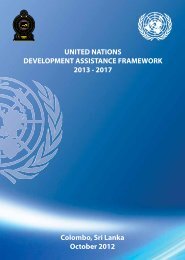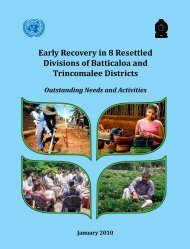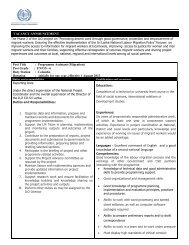Sri Lanka Human Development Report 2012.pdf
Sri Lanka Human Development Report 2012.pdf
Sri Lanka Human Development Report 2012.pdf
Create successful ePaper yourself
Turn your PDF publications into a flip-book with our unique Google optimized e-Paper software.
The proportion of employment in the informal sector has<br />
remained largely constant over the years.<br />
While overall unemployment is relatively low,<br />
disparities, both in terms of employment growth and<br />
kinds of employment, exist across provinces and sectors.<br />
Unemployment is higher among youths, the educated and<br />
women. For youth, it was just under 20 percent in 2010 -<br />
a worrisomely high rate, since this group could be easily<br />
mobilized to stir up unrest for political gain.<br />
Part of the reason for unemployed youths and unemployed<br />
people with education is that schools have not equipped<br />
them with the kinds of skills demanded by the labour<br />
market. Another reason is the lack of job creation,<br />
especially jobs attractive to an educated workforce. To a<br />
large extent, unemployment and education are different<br />
sides of the same coin. One cannot be tackled successfully<br />
without the other.<br />
In expanding demand and creating more and better jobs,<br />
especially outside the Western Province, improving access<br />
to markets, technology, infrastructure and finance can<br />
foster a climate for private investments and help create jobs.<br />
It will also be necessary to encourage entrepreneurship, so<br />
that individuals see starting a business as an alternative<br />
to finding employment. The Government could<br />
cultivate creativity and a culture of private investment<br />
by incorporating these elements in school curricula and<br />
providing incentives for starting business ventures. It could<br />
take the lead in improving the overall environment for<br />
doing business, which would give even small entrepreneurs<br />
a better chance to start and sustain their enterprises.<br />
One-third of those employed work in agriculture, where<br />
productivity is low and stagnant; a high proportion of the<br />
workers are in the informal sector. Even though agriculture<br />
is dominated by small private entitites, its problems require<br />
the assistance of the Government to raise productivity<br />
and move people into more remunerative livelihood<br />
opportunities.<br />
Unambiguous land rights, adequate irrigation facilities,<br />
efficient financial markets, better management of resources<br />
such as irrigation water supplies, and increased investment<br />
in research and extension services are among the measures<br />
that could boost productivity and investment in agriculture.<br />
Improved infrastructure to access economic centres, greater<br />
connectivity and dissemination of information through<br />
better access to and use of information technology, and<br />
open doors to finance would create more livelihood<br />
opportunities outside agriculture. There is especially<br />
strong justification to improve services in conflict-affected<br />
regions, given the breakdown of administrative systems<br />
and infrastructure. The Government is rightly engaged in<br />
making huge investments to restore livelihoods there, but<br />
the destruction of family units, land mines and competition<br />
for resources are among the factors complicating the task.<br />
For <strong>Sri</strong> <strong>Lanka</strong> to continue making rapid human<br />
development, public and private investment in agriculture<br />
and non-agriculture will be essential. The Government<br />
could lead the way in investing in irrigation, research and<br />
extension services, roads and other public goods. Once<br />
these are in place, they could attract private investment.<br />
There is little dispute that adequate public infrastructure is<br />
an important determinant of private investment.<br />
Strengthen governance mechanisms to<br />
broaden participation and utilize resources<br />
more effectively<br />
This report has underscored the need for increased public<br />
investments, especially in education, health, agriculture,<br />
science and technology, and in provinces besides the<br />
Western Province. Governance mechanisms in turn must<br />
be strengthened to monitor the use of resources.<br />
Governance is the responsibility of the Government, but<br />
all stakeholders can, and should, play a role. The private<br />
sector, non-governmental organizations, farmers, women,<br />
student organizations, ordinary citizens and other groups<br />
need to mobilize to demand more adequate and responsive<br />
governance. Governance functions best when it is pushed<br />
simultaneously from above and below, from the centre and<br />
society at large.<br />
With stagnating international resources at best, the<br />
Government needs to improve revenue collection<br />
Chapter 7<br />
Building on Peace, Progress and Security 123






